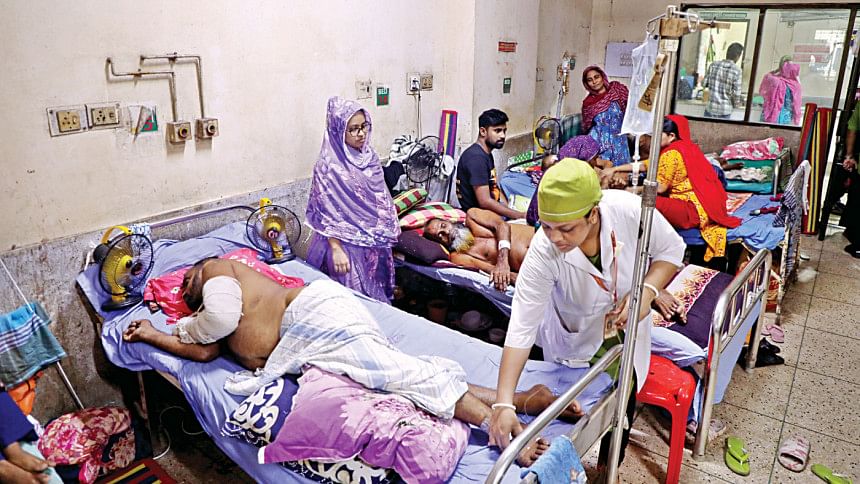Doctors’ protests: Regular services stay suspended at DMCH

With no inpatient or outpatient services amid a strike following an assault on a doctor, the emergency department of Dhaka Medical College Hospital (DMCH) yesterday witnessed a heavy workload.
The protesting doctors, however, agreed to resume treating outpatients from 10:00am to 1:00pm and inpatient care on a limited scale from today. They said the emergency department would remain open as before.
They reiterated their two demands at a press conference around 4:00pm yesterday, where Abdul Ahad, resident surgeon of DMCH neurosurgery department, spoke to the reporters on behalf of the protesting doctors.
The demands include the arrest and punishment of the culprits who attacked the doctor. Physicians also want the introduction of a health police force under the Directorate General of Health Services (DGHS) to ensure the security of healthcare workers at hospitals.
The protesters announced a sit-in programme to be held from 8:00am to 10:00am today.
The doctor came under attack after the death of a private university student from road crash injuries on Saturday. The attack was carried out allegedly by the student's peers, who alleged medical negligence had caused his death.
In response, physicians went on strike Sunday at major public hospitals in the capital and several districts, causing patient suffering. Healthcare services at DMCH, the country's largest healthcare facility, were halted for over 10 hours.
Doctors at Sir Salimullah, Shaheed Suhrawardy, and Mugda medical college hospitals in Dhaka and public hospitals in several districts, including Chattogram and Khulna, joined the strike following a call for a "complete shutdown" in the afternoon.
Patients, especially those in critical condition, were put in serious trouble when healthcare workers and medical students called for strikes in public and private hospitals nationwide. However, services in most private and some public hospitals remained unaffected.
Emergency healthcare services resumed at DMCH yesterday as army and Border Guard Bangladesh personnel ensured doctors' security. However, outpatient, inpatient and routine medical services remained suspended, leading to an increased patient load at the emergency department.
The hospital's outpatient ticket counters were closed yesterday morning. Several patients and their relatives – unaware of the ongoing strike – were seen waiting for medical attention. Many had travelled from around the city and surrounding areas, only to find that services were unavailable.
Jabbar Ali brought her daughter Shahida, but failed to get treatment for her skin condition for two days as they could not see a doctor. He learnt about the strike from a nurse. "Now we'll have to come another day," he told The Daily Star.
Rokeya Begum, another Hazaribagh resident with skin complications, expressed similar frustration. "I wouldn't have spent money to come to the hospital had I known about the doctors' strike. What'll I do now?" she said.
Like many others seeking outpatient care, Rokeya headed to the already overwhelmed emergency department for treatment. This created significant pressure on emergency doctors, who struggled to manage the influx of patients and eventually turned away some patients.
Happy Akhter, a resident of Narayanganj who recently underwent gallbladder surgery at DMCH, came to have her stitches removed but was unable to see a doctor. "I've been to the outpatient and emergency departments several times since 8:00am, but the doctors keep telling me to come back later," she said.
DMCH Director Brig Gen Md Asaduzzaman told The Daily Star yesterday that emergency services had been operational since the previous night and that the safety of doctors had been ensured.
Admitted patients, including those in the ICU and CCU, were being monitored, and the rest of the hospital's services would resume later in the day, he added.
Arif Hossain, an assistant professor at the casualty department, said that it was not feasible to treat outpatients at the emergency department. "Patients are coming in as usual today, and we are doing our best," he added.
According to hospital records, DMCH typically has 4,000 to 5,000 inpatients daily, despite having only 2,600 beds.
In Barishal, outpatient services at Sher-e Bangla Medical College Hospital were completely halted at 11am yesterday as the doctors stopped working to press home their demand for workplace security.
Our correspondent reported that emergency, inpatient, and operation theatre services at the hospital continued as usual.

 For all latest news, follow The Daily Star's Google News channel.
For all latest news, follow The Daily Star's Google News channel. 



Comments